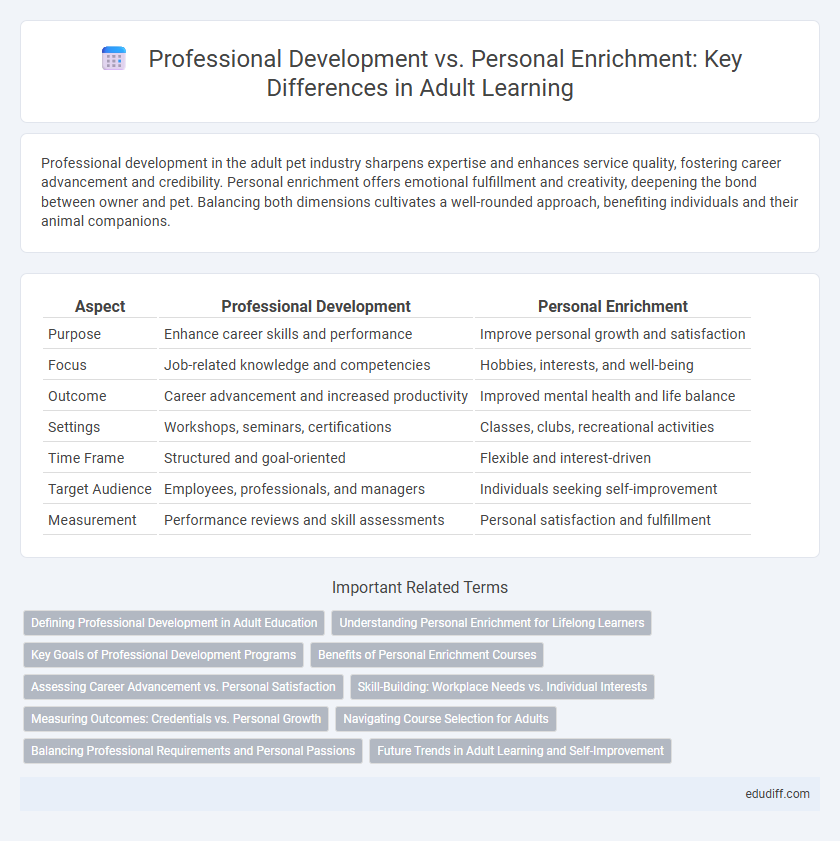Professional development in the adult pet industry sharpens expertise and enhances service quality, fostering career advancement and credibility. Personal enrichment offers emotional fulfillment and creativity, deepening the bond between owner and pet. Balancing both dimensions cultivates a well-rounded approach, benefiting individuals and their animal companions.
Table of Comparison
| Aspect | Professional Development | Personal Enrichment |
|---|---|---|
| Purpose | Enhance career skills and performance | Improve personal growth and satisfaction |
| Focus | Job-related knowledge and competencies | Hobbies, interests, and well-being |
| Outcome | Career advancement and increased productivity | Improved mental health and life balance |
| Settings | Workshops, seminars, certifications | Classes, clubs, recreational activities |
| Time Frame | Structured and goal-oriented | Flexible and interest-driven |
| Target Audience | Employees, professionals, and managers | Individuals seeking self-improvement |
| Measurement | Performance reviews and skill assessments | Personal satisfaction and fulfillment |
Defining Professional Development in Adult Education
Professional development in adult education refers to structured learning activities aimed at enhancing an individual's skills, knowledge, and competencies within their profession. It typically involves workshops, certifications, and continuous training designed to advance career goals and improve job performance. This focused approach contrasts personal enrichment, which centers on learning for personal growth and satisfaction without direct professional application.
Understanding Personal Enrichment for Lifelong Learners
Personal enrichment in lifelong learning emphasizes intrinsic motivation, creativity, and self-discovery beyond career advancement. It fosters emotional intelligence, cultural awareness, and well-being, providing a holistic growth experience that enhances life satisfaction. Lifelong learners engaging in personal enrichment develop adaptive skills and resilience essential for navigating an evolving world.
Key Goals of Professional Development Programs
Professional development programs primarily target enhancing job-specific skills, increasing employee productivity, and fostering leadership abilities, which contribute directly to career advancement and organizational growth. These programs emphasize measurable outcomes such as certifications, technical proficiency, and strategic decision-making capabilities. Unlike personal enrichment, which centers on self-improvement and well-being, professional development aligns closely with industry standards and business objectives to optimize workforce performance.
Benefits of Personal Enrichment Courses
Personal enrichment courses enhance creativity, emotional intelligence, and overall well-being by fostering self-awareness and stress management skills, which contribute to a balanced lifestyle. These courses promote lifelong learning and adaptability, equipping adults with the ability to navigate personal challenges and improve interpersonal relationships. Engaging in personal enrichment leads to increased motivation and fulfillment, positively impacting both home and professional environments.
Assessing Career Advancement vs. Personal Satisfaction
Assessing career advancement involves evaluating measurable progress such as promotions, salary increases, and skill acquisition that directly impact professional growth. Personal satisfaction centers on intrinsic rewards like fulfillment, work-life balance, and emotional well-being derived from activities beyond job performance. Balancing professional development with personal enrichment fosters holistic growth, enhancing both career trajectory and overall life satisfaction.
Skill-Building: Workplace Needs vs. Individual Interests
Professional development focuses on acquiring skills directly aligned with workplace needs, enhancing job performance and career advancement. Personal enrichment emphasizes learning driven by individual interests, fostering creativity, critical thinking, and lifelong growth beyond job demands. Balancing skill-building between organizational objectives and personal passion maximizes both employee satisfaction and productivity.
Measuring Outcomes: Credentials vs. Personal Growth
Professional development often emphasizes measurable outcomes such as certifications, licenses, and industry-recognized credentials that validate specific skills and competencies. In contrast, personal enrichment prioritizes intangible benefits like enhanced creativity, emotional intelligence, and self-awareness, which are less quantifiable but contribute significantly to overall well-being. Measuring outcomes in professional development relies heavily on standardized assessments, while personal growth is typically assessed through self-reflection and qualitative feedback.
Navigating Course Selection for Adults
Choosing between professional development and personal enrichment courses requires adults to assess career goals alongside personal interests. Professional development programs enhance workplace skills, increase job marketability, and often lead to promotions or salary improvements. Personal enrichment classes foster creativity, reduce stress, and contribute to overall well-being without direct career advancement benefits.
Balancing Professional Requirements and Personal Passions
Balancing professional development and personal enrichment is essential for maintaining long-term career satisfaction and overall well-being. Integrating continuous skill-building in your industry with activities that fuel personal passions enhances productivity, reduces burnout, and fosters a more holistic growth experience. Prioritizing both professional requirements and personal interests leads to a sustainable, fulfilling adult life.
Future Trends in Adult Learning and Self-Improvement
Emerging trends in adult learning emphasize integrating professional development with personal enrichment through digital platforms, adaptive learning technologies, and micro-credentialing systems. Growth in AI-driven personalized learning paths enhances skill acquisition efficiency in areas like leadership, emotional intelligence, and technical expertise, addressing the evolving job market demands. Self-improvement strategies increasingly incorporate mindfulness, resilience training, and lifelong learning frameworks to support holistic adult development in a rapidly changing global economy.
Professional development vs Personal enrichment Infographic

 edudiff.com
edudiff.com